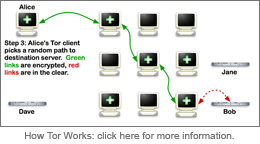Tor: An anonymous Internet communication system
Tor is a toolset for a wide range of organizations and people that want to improve their safety and security on the Internet. Using Tor can help you anonymize web browsing and publishing, instant messaging, IRC, SSH, and more. Tor also provides a platform on which software developers can build new applications with built-in anonymity, safety, and privacy features.
Your traffic is safer when you use Tor, because communications are bounced around a distributed network of servers, called onion routers. Instead of taking a direct route from source to destination, data packets on the Tor network take a random pathway through several servers that cover your tracks so no observer at any single point can tell where the data came from or where it's going. This makes it hard for recipients, observers, and even the onion routers themselves to figure out who and where you are. Tor's technology aims to provide Internet users with protection against "traffic analysis," a form of network surveillance that threatens personal anonymity and privacy, confidential business activities and relationships, and state security.
Traffic analysis is used every day by companies, governments, and individuals that want to keep track of where people and organizations go and what they do on the Internet. Instead of looking at the content of your communications, traffic analysis tracks where your data goes and when, as well as how much is sent. For example, online advertising companies like Fastclick and Doubleclick uses traffic analysis to record what web pages you've visited, and can build a profile of your interests from that. A pharmaceutical company could use traffic analysis to monitor when the research wing of a competitor visits its website, and track what pages or products that interest the competitor. IBM hosts a searchable patent index, and it could keep a list of every query your company makes. A stalker could use traffic analysis to learn whether you're in a certain Internet cafe.
Tor aims to make traffic analysis more difficult by preventing eavesdroppers from finding out where your communications are going online, and by letting you decide whether to identify yourself when you communicate.
Tor's security is improved as its user base grows and as more people volunteer to run servers. Please consider installing it and then helping out. You can also learn more about Tor here.
Part of the goal of the Tor project is to deploy a public testbed for experimenting with design trade-offs, to teach us how best to provide privacy online. We welcome research into the security of Tor and related anonymity systems, and want to hear about any vulnerabilities you find.
Tor is an important piece of building more safety, privacy, and anonymity online, but it is not a complete solution. And remember that this is development code—it's not a good idea to rely on the current Tor network if you really need strong anonymity.
Currently, Tor development is supported by the Electronic Frontier Foundation. Tor was initially designed and developed as part of the U.S. Naval Research Laboratory's Onion Routing program with support from ONR and DARPA.
The or-announce mailing list is a low volume list for announcements of new releases. You can read the archives or subscribe.


